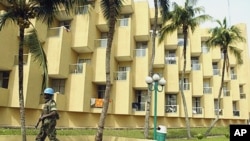Ivory Coast's disputed election has produced two rival presidents who head two competing governments. But only one of those leaders occupies the presidential palace. The other is in a resort hotel protected by U.N. peacekeepers. Most of the world leaders now recognize the Abidjan hotel as the country's seat of power.
With government troops surrounding the Golf Hotel, the only way civilians get in or out is by helicopter.
A Ukrainian crew pilots the five-minute U.N. flight carrying daily newspapers and mail, cartons of milk and cases of water, a box of printer cartridges, and the men and women who clean the hotel and pump its sewage.
The Russian-made helicopter circles Abidjan's main lagoon, coming to rest on a makeshift landing pad in the hotel's back lawn.
This is the center of government for Alassane Ouattara, the man who Ivory Coast's electoral commission and most of the international community recognize as the duly-elected president. But incumbent leader Laurent Gbagbo is not giving up power because his allies on the constitutional council annulled enough ballots to put him ahead of Mr. Ouattara.
That has led to a standoff between rival governments with Mr. Gbagbo's Cabinet shuffling between downtown ministries and Mr. Ouattara's Cabinet confined to the Golf Hotel.
Mr. Ouattara's press people work out of the general manager's office. Political supporters play cards in the near-empty lobby where the cash machine is empty, the travel agency is closed and waiters give change with paper credit slips because there is a shortage of small bills.
Keith Edward is a legal counselor to Mr. Ouattara.
"Even though you are within the city, you still do not know what is going on in an environment where you have a lot of information that is difficult to verify," Edward said.
Edward checked-in to the Golf before November's vote when people moved freely. He says the army's blockade has been hardest on people with family on the other side.
"Most of the people here live in the city,” he added. “So they have family members, kids, husbands, spouses on the other side of the bridge and there is no physical connection except, thank God, they do have a good cell phone system in this country."
Mr. Gbagbo's foreign minister Alcide Djedje says the Golf Hotel is not a prison.
Djedje says the blockade is meant to protect Ivorians and diplomats who live near the hotel.
Ouattara supporter Allomo Kouassi has not left the hotel in over one month, but agrees it is not prison. He says the prisoner in Ivory Coast is Laurent Gbagbo.
Kouassi says everyone in the hotel has one objective, that Mr. Gbagbo leave power. As for eating or not eating, Kouassi says they will eat well tomorrow. Their objective now is to lift all the barriers. And for them, he says, the barrier for Ivory Coast is Laurent Gbagbo.
Djedje says Mr. Gbagbo would gladly lift the blockade if not for the more than 300 heavily-armed rebels who are living at the hotel.
Djedje says the military can not allow those rebels free movement when they are less than a five-minute boat ride from Mr. Gbagbo's residence.
Two rebels play a board game on the patio where women sell phone cards at a 10-percent mark-up. Senegalese peacekeepers do laundry by the pool, their clothes drying across plastic lounge chairs circling the now-deserted pool bar. A Pakistani officer leads soldiers and civilians in daily prayers near a long, white U.N. tent.
A still-uniformed hotel groundskeeper mows tall grass around rows of peacekeepers' camouflaged tents. Armored personnel carriers block the front entrance. Sandbagged machine-gun placements crowd the outside stairs. Stacked rows of concertina ring the narrow marsh at the edge of the lagoon.
Gbagbo supporters derisively refer to Mr. Ouattara's hotel as La Republique de Golf, implying that his influence extends no farther than the soldiers surrounding it.
But legal counsel Edward says the two sides of Abidjan's political divide are more similar than most people think.
"Miscommunication is a major fact,” said Edward. “And due to the miscommunication, that influences the behavior of the people on both sides. More than once I have seen females crying because they think their child has disappeared or the family crying on the other side because they are thinking that bombs just fell on us."
At dusk on the hotel's back lawn, there is a football [soccer] match between Jordanian peacekeepers and Ivorian rebels. They may be protecting the same man, but on the pitch there is plenty of pushing.
The head of U.N. peacekeeping wants to boost this force during the next few weeks. But Mr. Gbagbo says everyone, including these nearly 800 soldiers guarding Mr. Ouattara's hotel, must leave Ivory Coast as he no longer has confidence in their neutrality because they are protecting his rival.




